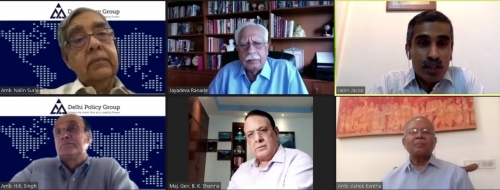DPG Webinar: Assessing China’s Post COVID-19 Activism and Outcomes of the National People’s Congress
Date: June 05, 2020
On June 5, 2020 the Delhi Policy Group hosted a Webinar on the subject “Assessing China’s Post COVID-19 Activism and Outcomes of the National People’s Congress”. The Webinar panel was moderated by Amb. Nalin Surie and included Amb. H.K. Singh, Amb. Ashok Kantha, Mr. Jayadeva Ranade, Maj. Gen. B. K. Sharma and Prof. Jabin Jacob.
Discussions revolved around China’s attempts to deflect damage to its global reputation and to preserve its centrality in global manufacturing value chains. The proceedings of the National People’s Congress 2020 (May 22-28) and Foreign Minister Wang Yi’s cautioning the West not to turn its relationship with China into systemic rivalry were analysed during the Webinar.
The speakers critically evaluated Beijing’s assertive “Wolf Warrior” diplomacy as well as China’s attempts to portray itself as a saviour of the world in handling the Covid-19 crisis. They further explained that such aggressive diplomacy was also aimed at convincing the domestic audience that the government is proactively promoting national interests in spite of Covid-19 challenges. Incipient unrest due to increasingly stringent internal security measures (including facial recognition and social credit management systems), Xi’s centralisation of power during the pandemic crisis, growing unemployment (which soared from 17-20m in 2019 to 70-80m by March 2020) and growing challenges to China’s BRI projects were flagged during the discussions. It was also noted that China has continued to advance its strategic interests, particularly in Hong Kong, Taiwan, and the South China Sea.
Discussions on the India-China border standoff factored-in probable objectives of the CPC senior leadership, such as Beijing’s attempts to manage Dalai Lama’s succession as well as preserve the growing Chinese economic engagement in Pakistan through CPEC. The determinants of Beijing’s post-COVID-19 external activism, such as decelerating economic growth trajectory, were also examined in detail. With respect to India’s approach towards China, the speakers noted that Delhi needs to adopt a whole-of-nation approach to deal with a belligerent China, including close coordination between the government and private sector enterprises.
Discussions revolved around China’s attempts to deflect damage to its global reputation and to preserve its centrality in global manufacturing value chains. The proceedings of the National People’s Congress 2020 (May 22-28) and Foreign Minister Wang Yi’s cautioning the West not to turn its relationship with China into systemic rivalry were analysed during the Webinar.
The speakers critically evaluated Beijing’s assertive “Wolf Warrior” diplomacy as well as China’s attempts to portray itself as a saviour of the world in handling the Covid-19 crisis. They further explained that such aggressive diplomacy was also aimed at convincing the domestic audience that the government is proactively promoting national interests in spite of Covid-19 challenges. Incipient unrest due to increasingly stringent internal security measures (including facial recognition and social credit management systems), Xi’s centralisation of power during the pandemic crisis, growing unemployment (which soared from 17-20m in 2019 to 70-80m by March 2020) and growing challenges to China’s BRI projects were flagged during the discussions. It was also noted that China has continued to advance its strategic interests, particularly in Hong Kong, Taiwan, and the South China Sea.
Discussions on the India-China border standoff factored-in probable objectives of the CPC senior leadership, such as Beijing’s attempts to manage Dalai Lama’s succession as well as preserve the growing Chinese economic engagement in Pakistan through CPEC. The determinants of Beijing’s post-COVID-19 external activism, such as decelerating economic growth trajectory, were also examined in detail. With respect to India’s approach towards China, the speakers noted that Delhi needs to adopt a whole-of-nation approach to deal with a belligerent China, including close coordination between the government and private sector enterprises.



